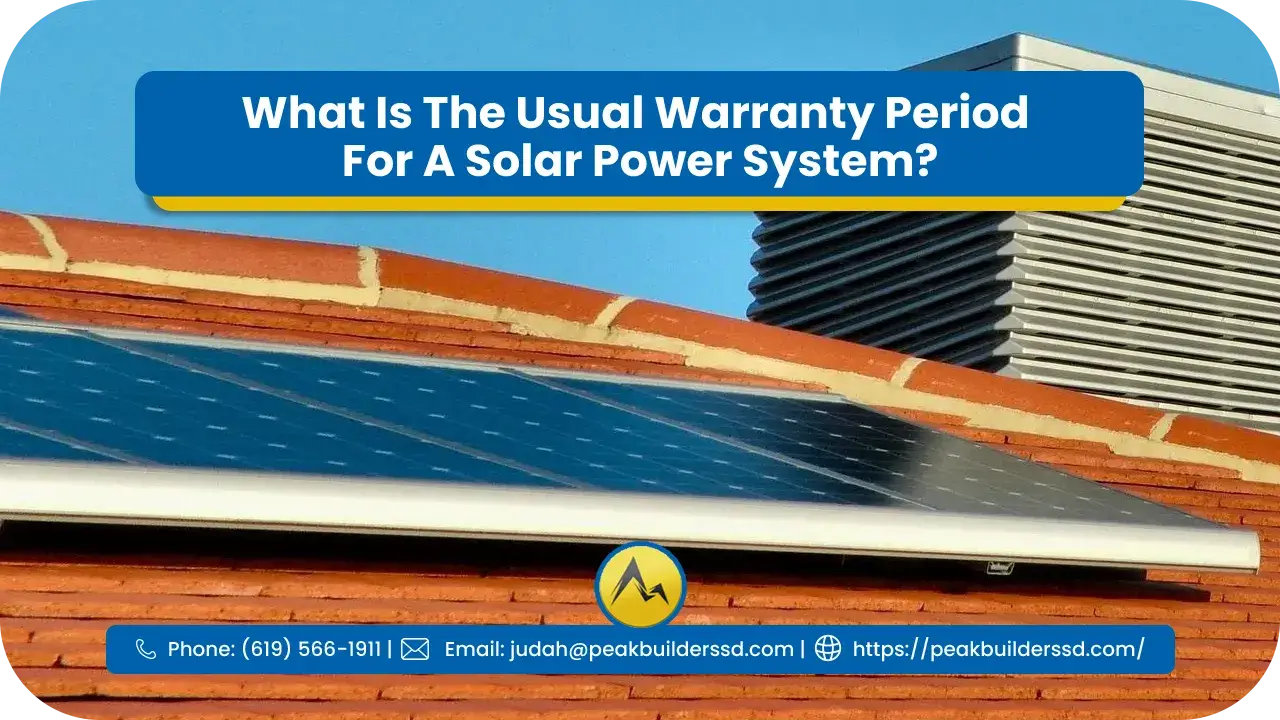Installation of a solar energy system is an attractive proposition for homeowners, as it has the potential to reduce the cost of energy and also reduce the carbon footprint. However, the cost of installing a system could be very expensive, particularly for those systems with top-of-the-line components and panels. As such, it is crucial to understand what the typical warranty period for solar power systems is. The typical warranty duration for the solar system is dependent on the components of the system as well as the manufacturer. Generally, the system components will be divided into two groups which are the solar panels as well as the inverters. The solar panels typically have an extended warranty of 25 years, while the inverters typically come with a 10-year guarantee. Of course, there are brands that may provide longer warranties however this is the minimum you can expect in most cases.
Are you planning for Solar Power System Installation in Otay for your home? Look no further than Peak Builders which specializes in Solar Power System Installation in Otay! We can provide you with excellent services at affordable rates! Call us today to schedule an appointment.

When investing in a solar power system, understanding the warranty period and its coverage is essential for ensuring long-term reliability and protection of your investment. Warranties for solar systems can vary, but most systems come with several standard guarantees. Below is a detailed look at the typical warranty periods for various components of solar systems.
Standard Warranty for Solar Systems
- 25-Year Warranty: The majority of solar power systems come with a 25-year warranty. This is considered the industry standard and generally covers defects in materials or workmanship. The warranty ensures that your solar system will operate at a specified level of efficiency over the years, protecting your investment.
- Energy Performance Guarantee: In addition to covering defects, some warranties also include an energy performance guarantee. This ensures that your solar system will generate a certain amount of energy over the warranty period. If your system underperforms, you may be entitled to repairs, replacements, or compensation.
Component-Specific Warranties
- Inverters: Inverters are a critical part of your solar system, converting solar energy into usable electricity. Most inverters are covered by warranties ranging from 5 to 20 years. However, the exact duration can vary depending on the manufacturer and the specific model. Some inverters come with a standard 10-year warranty, while others may offer extended coverage of up to 20 years.
- Solar Panels: Most solar panels are covered by warranties that ensure they perform at a certain level of efficiency for up to 25 years. However, many panels also come with a linear performance warranty, which guarantees a gradual decrease in performance over time. Typically, this ensures that after 25 years, the panel will still produce around 80% of its original capacity. The exact coverage can differ by manufacturer, so it’s important to read the fine print.
Installation Warranty
- Warranty on Installation: The warranty on the installation of your solar system generally covers any defects related to the setup, such as improper mounting or wiring errors. Installation warranties typically last between 1 and 10 years, depending on the installer. Some installers may offer extended warranties for their work, but it’s essential to verify these details beforehand.
- Common Installation Issues: Common issues covered by installation warranties include loose panels, faulty wiring, or structural damage due to improper mounting. If your system experiences problems due to installation errors, the installer is responsible for repairs or reinstallation under the warranty terms.
Manufacturer vs. Installer Warranties
- Manufacturer Warranties: Solar equipment manufacturers typically offer warranties for individual components, such as panels, inverters, and batteries. These warranties usually cover defects in materials and workmanship and may also include guarantees for energy performance.
- Installer Warranties: Many solar installers provide warranties that cover the labor and installation work. These warranties protect against issues related to the system’s setup, like faulty wiring or installation defects. It’s important to clarify whether the installer warranty covers the entire system or just the labor involved in setting it up.
Coverage of All System Parts
- Comprehensive Coverage: Most solar system warranties cover all major components of the system, including solar panels, inverters, wiring, and mounting systems. These warranties protect against manufacturing defects, material issues, and normal wear and tear.
- Additional Components: Some systems also include coverage for optional components, such as batteries or monitoring systems. Be sure to check whether these additional parts are included in your warranty.
External Factors and Damage
- Weather and External Damage: Many solar warranties also cover damage caused by external factors, such as extreme weather conditions. This typically includes coverage for issues like hail, high winds, or snow damage. However, it’s important to verify if your warranty includes this type of protection, as some manufacturers or installers may exclude certain weather-related damages.
- Acts of God: Most warranties will not cover damages caused by acts of God (e.g., earthquakes, floods) or other extreme natural events. For full protection against such risks, some homeowners choose to purchase additional homeowner’s insurance that covers their solar power system.
Conclusion
The typical warranty period for solar power systems ranges from 10 to 25 years, providing ample coverage to protect your system and investment. To ensure your system is fully protected, it’s essential to carefully review the warranty details for each component—solar panels, inverters, installation work, and any additional parts. By understanding the coverage, you can make an informed decision and feel confident in the longevity and reliability of your solar energy system. Always ask both the installer and manufacturer for clarification on specific terms before committing to a solar system.
Can I Get A Solar Power System Installed On A Rental Property in Otay?
The number of solar Panels Are Needed To Power A House in Otay?

